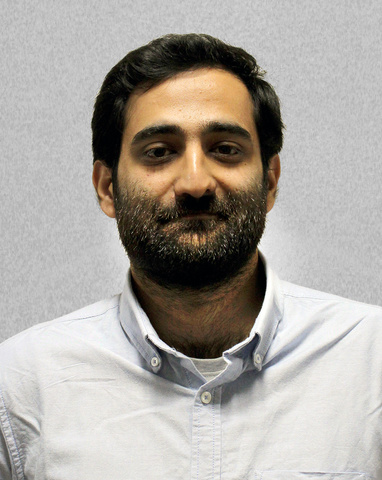Maaz Musa - a 4th year PhD as of Fall '22, advised by Rishab Nithyanand - recently attended PETS 2022: The 22nd Privacy Enhancing Technologies Symposium.

This was Musa's 2nd conference attendance, where he also presented his first 1st author paper.
Upon returning from Sydney, Australia, he was kind enough to answer a few questions for us:
How did your High School and undergraduate studies lead you to the U. of Iowa as a PhD student? What most influenced your choice to pursue a UIowaCS PhD?
Research in Pakistani undergrad universities is EXTREMELY rare. I happen to be lucky enough to get in touch with one of the few research labs in Pakistan (TPI lab in LUMS). From there I started working with UIowa professors Zubair [Shafiq; now at UC Davis] and Rishab. After a few months of working, it was time to apply for grad school and it was very obvious that finding a better advisor than Rishab would be difficult. PhD is all about your interest in the field, your advisor and your environment. UIowa checked all those boxes so coming to UIowa was the right decision.
How has your experience at Iowa been -- including research in SPARTA lab, courses (as student &/or TA), and other outside-the-department endeavors?
My time at UIowa has been very pleasant so far, for various reasons. There was a great grad student and administrative community present here which helped me adjust effortlessly. They helped me in every aspect possible, accommodation, advice, socializing. I enjoyed my time TAing as well because the professors I TAed for were amazing (Alberto [Segre], Brandon [Myers] etc.). I met more grad students through TAing as well and it was just a great experience overall because I love teaching. As a student myself I found UIowa to be very accommodating and helpful. My coursework has now been completed but I would want to audit a few courses just because I like the standard of classes here. Last but definitely not the least is my work at SPARTA lab. I initially was working on NLP and media discourse, but my advisor very proactively realized that I was much more interested in auditing online tracking, even before I had fully realized it. He then presented me with a project "ATOM" which I enjoyed thoroughly and that is when I decided to continue working in this specific area.

Speaking of research and this ATOM project, a recent paper of yours, entitled “ATOM: A Generalizable Technique for Inferring Tracker-Advertiser Data Sharing in the Online Behavioral Advertising Ecosystem” – written in collaboration with your advisor Rishab Nithyanand – was a runner-up for the PETs Andreas Pfitzmann Best Student Paper Award. Congratulations! I understand that you felt this was a successful conference even before getting this accolade. How do you feel now?
The runners-up for the Andreas Pfitzmann Best Student Paper Award are: ATOM: A Generalizable Technique for Inferring Tracker-Advertiser Data Sharing in the Online Behavioral Advertising Ecosystem by @MaazBinMusa and @rishabn_ #pets22
— PETS (@PET_Symposium) July 14, 2022
Personally, I believe everyone is disturbed by the level of tracking and privacy invasion by trackers and advertisers these days. As such, that is what motivated us as well to uncover these entities. Academically, previous work from SPARTA lab inspired us to create ATOM. This previous work was a very specific version of what ATOM is now. ATOM is an artifact independent, scalable and robust framework.
Getting recognition for ATOM has been the highlight of my grad school so far. I was ecstatic that I had published my first 1st author paper and was getting an opportunity to present it. On top of that the conference was held in beautiful Sydney. Attending the conference in person I met so many relevant people and learned so much, which was equivalent to 10 virtual conferences at least. The award was just the cherry on top for which I am extremely grateful, and I feel like my advisor deserves this more than I do because as this was my first independent project, I made several mistakes on the way which he would very calmly correct me on.
Could you give us a sneak peek of future ATOM work (e.g., other media forms or overcoming limitation)? Any other paper “in the works”?
One of the insights we got from ATOM was the lack of validation for relationships between trackers and advertisers. Hence, we are currently working on analyzing the level of disclosure data brokers present on scale, and how much are they even required to disclose under CCPA.
Any take-aways you would like to share from attending PETS?
- In person conferences are MUCH more productive (if organized properly)
- What is the future of Privacy Enhancing Technologies (more focus on industry guiding policy)
- Don't be afraid to talk to new people at conferences, you get great ideas and insights just by talking to people
- If you have any ideas test them out on these people at the conference. They give amazing feedback
- Attend as many talks as you can, not just the ones that are in your field
What advice do you have for our current and prospective students?
For current students, I would suggest work with professors who are working on things you find interesting. Or take new ideas to them if you have any. Professors are ALWAYS looking for good students and ideas. Don't be afraid to take that step.
For more on Maaz' work and additional reflections on his research, one may head to his personal website, which includes blog posts and other publications.
